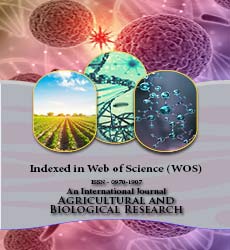Agricultural and Biological Research
RNI # 24/103/2012-R1
Moges Tadesse Gedamu
Assessment of soil quality has been recognized as an important step in understanding the effect of land management practices within agricultural lands. This study was designed to assess the quality soil based on some selected soil quality parametrs for agricultural purpose at Agamsa sub-watershed. Soil samples were collected from the 0-30 cm depth from eight locations in the study area. For the present study, SOC, electrical conductivity, available P, soil pH, total nitrogen, CEC, bulk density, soil separates (sand, silt, and clay), plant available water, exchangeable basic cations (Ca, Mg, and K), and DTPA extractable micronutrients (Fe, Mn, Cu, and Zn) were selected as potential soil quality indicators. A minimum dataset and linear scoring technique were used to evaluate the soil quality index. The PCA analysis identified total nitrogen, soil pH, DTPA-extractable Fe, available P, plant available water, bulk density, sand, and silt as an indicator for soil quality evaluation. The result of the study revealed that 25%, 37.5%, 12.5%, and 12.5% of the soil sampling unit was very high, high, moderate, and low in its quality index classes, respectively. Therefore, periodically assessing and maintaining soil quality will be indispensable for better yield and sustainable productivity in the study area.
